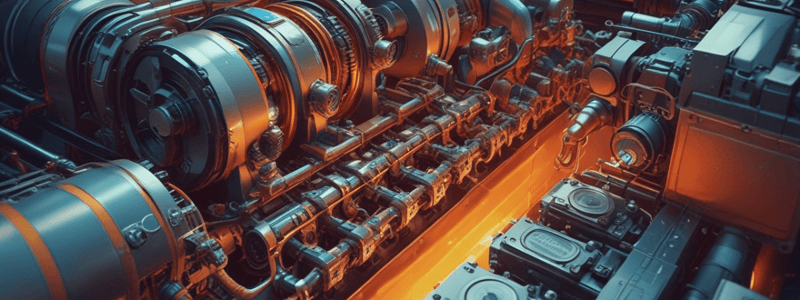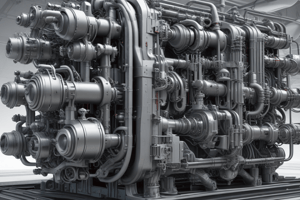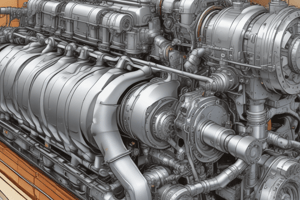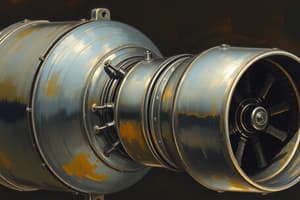Podcast
Questions and Answers
What is the most common cause of low engine oil pressure?
What is the most common cause of low engine oil pressure?
- Incorrect oil viscosity
- Faulty pressure regulating valve (correct)
- Plugged oil cooler
- Cracked oil lines
How can the length of time since the last engine overhaul help diagnose low oil pressure?
How can the length of time since the last engine overhaul help diagnose low oil pressure?
- It can indicate if the oil pressure was slowly getting worse over time (correct)
- It can determine if the low oil pressure is expected
- It can pinpoint the exact cause of the low oil pressure
- It can help identify if the oil pump needs to be replaced
What is the primary cause of high engine oil pressure?
What is the primary cause of high engine oil pressure?
- Engine re-programmed to operate at a higher speed (correct)
- Plugged oil cooler
- Incorrect oil viscosity
- Faulty oil pressure sending unit
What is the most likely cause of high engine oil temperature?
What is the most likely cause of high engine oil temperature?
How can noise indicate oil starvation in the engine?
How can noise indicate oil starvation in the engine?
What is the primary cause of an increase in oil clearances within the engine?
What is the primary cause of an increase in oil clearances within the engine?
What can cause increased oil consumption in off-road engines?
What can cause increased oil consumption in off-road engines?
What issue can arise if thinner oil is used in an engine?
What issue can arise if thinner oil is used in an engine?
Why is changing to a higher viscosity oil not recommended to reduce oil consumption before knowing the reason?
Why is changing to a higher viscosity oil not recommended to reduce oil consumption before knowing the reason?
What can happen if too much oil is poured into the oil pan?
What can happen if too much oil is poured into the oil pan?
Why is proper oil selection critical for engine operation?
Why is proper oil selection critical for engine operation?
What could be a result of low oil pressure in an engine?
What could be a result of low oil pressure in an engine?
Why is a mechanical oil pressure gauge installed in place of the pressure indicator on the dash?
Why is a mechanical oil pressure gauge installed in place of the pressure indicator on the dash?
What could result from installing a mechanical oil pressure gauge and finding low oil pressure?
What could result from installing a mechanical oil pressure gauge and finding low oil pressure?
Why should the test gauge results be compared with the readings of the dash indicator?
Why should the test gauge results be compared with the readings of the dash indicator?
What could occur if low oil pressure is not addressed?
What could occur if low oil pressure is not addressed?
Which of the following is NOT a way to diagnose faults in a lubrication system using your senses?
Which of the following is NOT a way to diagnose faults in a lubrication system using your senses?
What can cause increased oil consumption in an aging engine?
What can cause increased oil consumption in an aging engine?
Which engine design factor can contribute to increased oil consumption?
Which engine design factor can contribute to increased oil consumption?
What can an inspection of the oil filler opening reveal about the lubrication system?
What can an inspection of the oil filler opening reveal about the lubrication system?
Which component, shown in the provided figure, can also reveal signs of oil problems?
Which component, shown in the provided figure, can also reveal signs of oil problems?
What is the root cause of metal-to-metal contact noises in a lubrication system?
What is the root cause of metal-to-metal contact noises in a lubrication system?
Flashcards are hidden until you start studying
Study Notes
Low Engine Oil Pressure
- The most common cause of low engine oil pressure is worn engine bearings.
- The length of time since the last engine overhaul can help diagnose low oil pressure, as worn engine bearings are more likely in an engine that has not been overhauled recently.
High Engine Oil Pressure
- The primary cause of high engine oil pressure is a faulty relief valve or a restricted oil system.
High Engine Oil Temperature
- The most likely cause of high engine oil temperature is a blocked oil cooler or a malfunctioning cooling system.
Oil Starvation
- Noise can indicate oil starvation in the engine, as it can cause metal-to-metal contact, leading to knocking or clunking sounds.
Oil Clearances
- The primary cause of an increase in oil clearances within the engine is wear on the engine bearings and cylinder walls.
Increased Oil Consumption
- In off-road engines, increased oil consumption can be caused by air filter blockage or inadequate air filter maintenance.
- In an aging engine, increased oil consumption can be caused by worn piston rings and cylinder walls.
Oil Selection
- Using thinner oil in an engine can cause increased oil consumption and wear on engine components.
- Changing to a higher viscosity oil is not recommended to reduce oil consumption before knowing the reason, as it can increase oil pressure and lead to engine damage.
- Proper oil selection is critical for engine operation, as it affects engine performance, fuel efficiency, and component longevity.
Oil Capacity
- Pouring too much oil into the oil pan can cause oil to overflow into the engine's crankcase, leading to engine damage.
Engine Damage
- Low oil pressure can result in engine damage, including wear on engine bearings and components.
- A mechanical oil pressure gauge can be installed in place of the pressure indicator on the dash to provide accurate oil pressure readings.
- If the test gauge results indicate low oil pressure, it can lead to engine damage if not addressed.
- The test gauge results should be compared with the readings of the dash indicator to ensure accuracy.
Diagnosing Faults
- One way to diagnose faults in a lubrication system is through visual inspection, such as inspecting the oil filler opening for signs of oil leaks or contamination.
- The oil pump screen can also reveal signs of oil problems, such as blockages or debris.
- The root cause of metal-to-metal contact noises in a lubrication system is oil starvation, which can lead to engine damage.
- Failure to address low oil pressure can result in catastrophic engine failure.
Studying That Suits You
Use AI to generate personalized quizzes and flashcards to suit your learning preferences.





